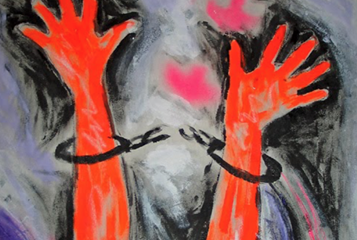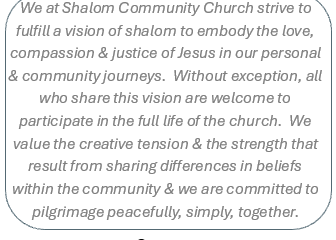On Reconciling
| It is February, and everything is frozen, and all of our forays into homesteading have screeched to a halt. The sheep fencing sags at the last attempted corner. The little barn stands, still roofless, filling up with snow. The rabbit trench has toughened to a rigid scar. The compost has hardened into ice, which means I am doing something wrong. (This offends me. I have worked very hard at the compost, though apparently not hard enough.)I am trying to use this time wisely—organize the garage, fix the broken tools, order seed potatoes and onion sets, and map out this year’s crop rotation. The winter is a gift because it is a break, a time to wrap one’s head around the state of things, to reflect and to plan. But it is also winter, and winter is harsh. It creates in me the animal urge to hibernate, preferably after loading up on a batch of banana muffins. Still, Scott and I continue to take walks each evening back and forth in front of our house. One of us usually has to talk the other one into it. Sometimes Scott will bring me my snowpants, and I will groan and stare at them for a while, until I bundle myself, and Scott bundles himself, and we walk.It is an exercise in reconciliation, I think, this walking. There is something about it that feels almost radical. To say, I want nothing more than to sit here and rot in the warmth of the furnace, but yes I will stand up, and yes I will walk out into the frozen world, and yes I will hate it for a moment but then less and less, until I begin to will it, until I begin to welcome it, until I stomp back inside affirmed in my audacity and victorious over the cold. |
 In pursuit of victory In pursuit of victory |
| But reconciling oneself with winter is very different from reconciling oneself with humans. Winter has not borrowed a thousand dollars and refused to pay it back. Winter has never taken you for granted, or questioned your parenting style, or suggested that you lower your muffin consumption. Winter holds no opposing political affiliation. Winter simply is until it is not, and what you do with that fact is entirely up to you. You can embrace it, you can avoid it, you can fly to the Florida Keys or freeze to death in a snowdrift. The winter will not care.People, however, are never that simple. Hypothetically, they are forgivable, but when we come to the hard questions of reconciliation, hypothetical is never what we’re talking about. These days, we’re talking about a former president so resistant to fact that he incited a violent coup rather than peacefully transfer power. We’re talking about the factions of his supporters who constructed a gallows complete with a noose, waved swastika flags, and wore clothing that read things like “Camp Auschwitz” and “6MWE,” which stands for “6 million (Jews) wasn’t enough.” CS Lewis wrote that if we really want to learn how to forgive, we’d better start with something easier than the Gestapo. Well joke’s on him because it feels like that’s almost where we are. When we talk about reconciliation today, we’re talking about things that aren’t our business to forgive, about things that are already causing great damage and, if unchecked, hold the future potential for much greater harm. That this harm is unlikely to hurt me personally makes any complicity on my part seem downright criminal.In my life, I’ve been wronged in some painful ways, and the empowering actions of forgiveness and reconciliation have brought me to a place of true freedom and growth. I have reconciled relationships I hold dear, ones for which I am daily grateful. But any small interpersonal triumphs in today’s world feel like tiny potatoes, and any effort we might make in a reconciled direction seems, if not downright pathetic, at least pointless. What good can we do, and why ought we even to attempt it? |
 Some good attempted Some good attempted |
| I am not going to suggest that we “meet Nazis halfway,” to quote Rebecca Solnit. I agree with her that there’s often a “devil’s bargain” buried in this way of proceeding. She writes: “The ethical is not halfway between white supremacists and human rights activists, rapists and feminists, synagogue massacrists and Jews…Who the hell wants unity with Nazis until and unless they stop being Nazis?”Who indeed? My goal is not to make a case for such unity—I do not think there is one to be made. And besides, few of us will be penning legislation or holding forth in the halls of congress. It is far more likely that we will come up against our own category of “other”—those who believe opposite things for mostly (to us) unfathomable reasons. And it is here that I’d liketo muddy the water a bit.This is the point where fiction can enter and where I am going to share a secret of the craft: Everyone understands their own actions. Everyone’s actions make sense to themselves. It follows, then, that there is always an understanding to be had. (I am using “understanding” in a general sense. We humans often act in ways we do not will, but there is usually some understanding of the reason we have done so. No, I did not decide to eat all of the muffins at once, but they were sweet and warm, and I was sad and cold, and with the muffins I could accomplish a brief relief from those feelings and a physical fullness to counteract the deep, unfillable hole at my core.) |
 Muffins in the making Muffins in the making |
| One of my favorite things to do in fiction is to take characters who might typically strike a reader as irredeemable and shed enough light on their inner life that the reader’s focus sharpens from “villainous” to “flawed.” In some genre fiction, one can write flat villains and get away with it—the reader accepts this treatment because the formula of the plot sometimes allows it. But writers cannot do this in literary fiction, and the reason they cannot do this is because it is not true. No one is wholly, flatly bad, and if someone writes a character who is, I will put down their book and never pick it back up. Why? Because the writer is operating on an elementary level of understanding, so they will have very little, in my opinion, that is worth taking the time to read.A second craft secret is that the writer develops a character’s essential complexity through a careful cultivation of details. I recently wrote a story in which a misogynistic independent Baptist man loses his wife and must raise their nine children on his own. A first reader wrote back, “I didn’t care about him at all until halfway through.” She suggested that I had frontloaded the story with all of his unflattering details and backloaded all of the positive ones. She was right. |
 Back to the page Back to the page |
| So how does all of this connect to reconciliation? I think what I want to remember, when I come up against these conversations, is that my knowledge of the other person’s details is always limited, and often severely so. In our current maelstrom, there is no end to the drawing and labeling of sides. The factions have been described to me in such definitive strokes that I begin to believe I can extrapolate and apply what I know of a group at large to each of its individual members. When one does this in fiction, one is treading dangerous water, and the same holds true for real life. There are some in my echo chamber, for example, who now view all Trump supporters as sympathetic with Nazis.The biggest trouble is that we are all cooperative readers. We take our pittance of details, and we use them to construct an entire character. What we fail automatically to consider is that we have often been frontloaded with only one or two of the most egregious details available and that a wealth of other details might otherwise have been disclosed that would lead our imaginations to very different conclusions.We know Trump to be a great charlatan, a great deceiver. Is it any wonder, then, that so many were deceived? “Every soul is deprived of truth against its will,” wrote Plato, and Marcus Aurelius added, “It is necessary to keep this in mind always, [to] make you milder toward everyone else.” Montaigne put it to stronger effect: “Why is it that we are not stirred up when we meet someone whose body is disfigured or disabled, yet cannot tolerate [what we see as] a malformed mind without being enraged? Such vicious severity reflects more on the critic than on the defect.” |
 Making connections Making connections |
| My question is this: Can we view those who oppose our ends as misled rather than intentionally bad? Can we, if only for the sake of preserving our own spirits, our own hope, foster in ourselves a sense of empathy and humility, acknowledging that we are all operating with imperfect knowledge, that we are all misled in our own separate ways?The truth remains that, despite decades of conversation, neither I nor my conservative family members have shifted much in our positions (though I do believe we’ve kept each other in a valuable state of tension). Regardless, I’m getting to the point where I keep connecting for the same reason I drop my glass jars off at the recycling center, the same reason I hang my clothes to dry. No, I am not reversing climate change, and no, I am not shutting down landfills one by one. But I am trying to live in line with the truths I have fought hard to learn—that small actions matter, that no flat villains exist, that our stories improve as our details deepen. And I am not allowed, in so doing, to exist only in my own echo chamber, nor are my family allowed to exist only in theirs. |
 Small actions Small actions |
| Walking out into the winter’s cold affirms something, not about the winter, but about ourselves. And walking out into the space that divides us affirms in me a hopeful spirit and a commitment that there is more to each person’s particular story than I can clearly see, that, if I had been confronted with my opponent’s same information and experiences, it is possible that I also would have come to the same conclusions.It is crucial, especially now, that we renounce hate in all of its forms. It is crucial that all of us, on both sides of the aisle, tirelessly confront it wherever we find it, and hold each other accountable. But it is also crucial to remember that it is possible to reject the hate without also rejecting the person and that this might just be the most powerful way to do it.I know that what I am offering is small. It is no cure for our current evils. But if we can carry compassion and curiosity forward, we can welcome the best of those across the way. And for now, that might be as much as we can hope for. |



0 Comments